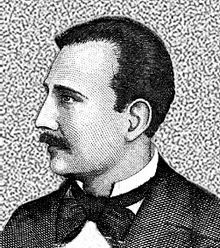Ramón Rosa
| Ramón Rosa Soto | |
|---|---|

Grabado de Ramón Rosa
|
|
|
Lieutenant Secretary of Finance of Guatemala |
|
|
In office 1871 – 1873 |
|
| President | Miguel Garcia Granados |
|
Secretary of Education of Guatemala Secretary of Foreign Affairs of Guatemala |
|
|
In office 1873–1876 |
|
| President | Gral. Justo Rufino Barrios |
|
Secretary General of Honduras |
|
|
In office 1876 – 1883 |
|
| President | Dr. Marco Aurelio Soto |
| Personal details | |
| Born |
Ramón Rosa Soto 14 July 1848 Tegucigalpa, Honduras |
| Died | 28 May 1893 (aged 44) Tegucigalpa |
| Political party | Liberal |
| Alma mater | Universidad Nacional de Guatemala |
Ramón Rosa Soto (14 July 1848 – 28 May 1893) was a prominent lawyer, journalist, politician and liberal writer of the second half of the nineteenth century. He was the ideologue of educational changes of Liberal Reform in Guatemala and then in Honduras. He served as Principal Minister during the rule of his cousin, Dr. Marco Aurelio Soto and was associated with Soto's mining investments.
Ramón Rosa, was the son of Juan José Soto and Isidora Rosa. He learned his first letters with a famous teacher in Honduras, who he later portrayed as the central character in his book The Scholastic teacher. He graduated BA in philosophy at the National University of Tegucigalpa and then attended college of law at the Faculty of Law and Notary of the National University of Guatemala where he was a classmate of his would-be inseparable cousin, Marco Aurelio Soto and the future archbishop of Guatemala, Ricardo Estrada Casanova . In this institution he studied with historian and diplomat Jose Milla and Vidaurre and former President of Colombia Dr. Mariano Espina, who had arrived to Guatemala in exile. He graduated in October 1871, at the age of 23. Shortly before, he had joined the Liberal Party in this country and had attacked the Conservative government of Marshal Vicente Cerna with articles in the newspaper El Central, which he co-founded. When the Liberal Reform triumphed in Guatemala, in June of that year, El Central supported the candidacy of General Miguel Garcia Granados in the plebiscite that was convened to elect a president between García Granados and Justo Rufino Barrios, the other liberal caudillo.
During the government of García Granados he served as deputy director of Finance and then the Ministry of Education in the government of Justo Rufino Barrios . During this government, was in charge of educational renewal in Guatemala, using the following liberal principles of government:
The office of Education was in the hands of Honduran intellectuals Rosa and Marco Aurelio Soto, who alternated their functions between it and the office of Foreign Affairs. The thought of both, strongly anticlerical, liberal intellectuals was reflected in liberal reforms education and religion in Guatemala, is summarized in these writings by Rosa in 1882: "In America, where popular instruction is spreading with the speed of light, and where it does not exist, as in Europe, deeply rooted and traditional religious interests, giving power and privilege to certain social classes; in our America, where freedom of conscience is already a definitive conquest: all, all the great religions have to disappear, at no distant day, with its artificial and contradictory dogmas, their liturgical theatrical devices, with their bloody histories, with their selfish and worldly interests badly disguised, with their hypocritical sanctities, and their privileged castes, and their execrable tyranny [...] ".
...
Wikipedia
